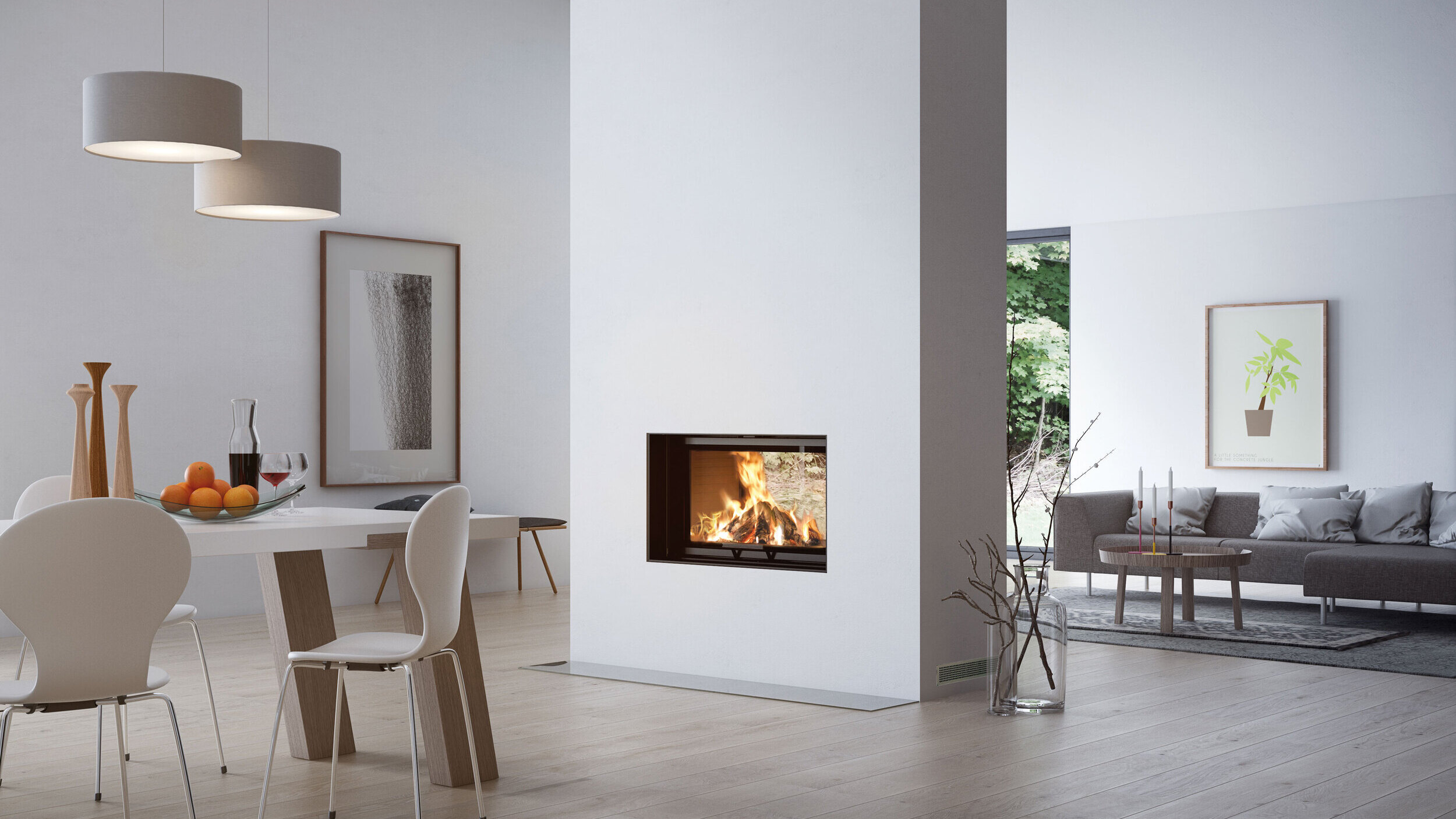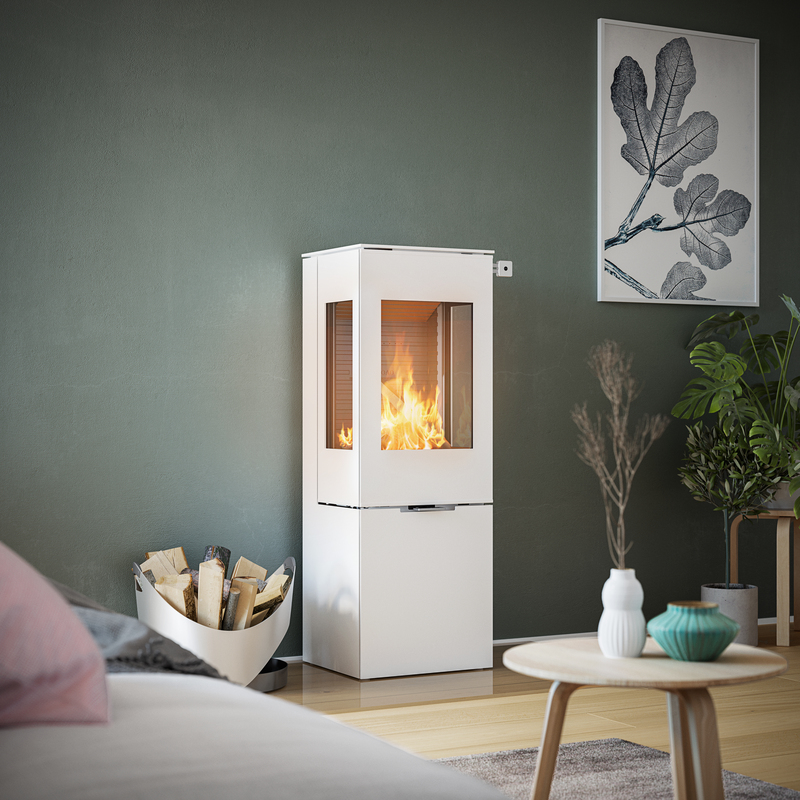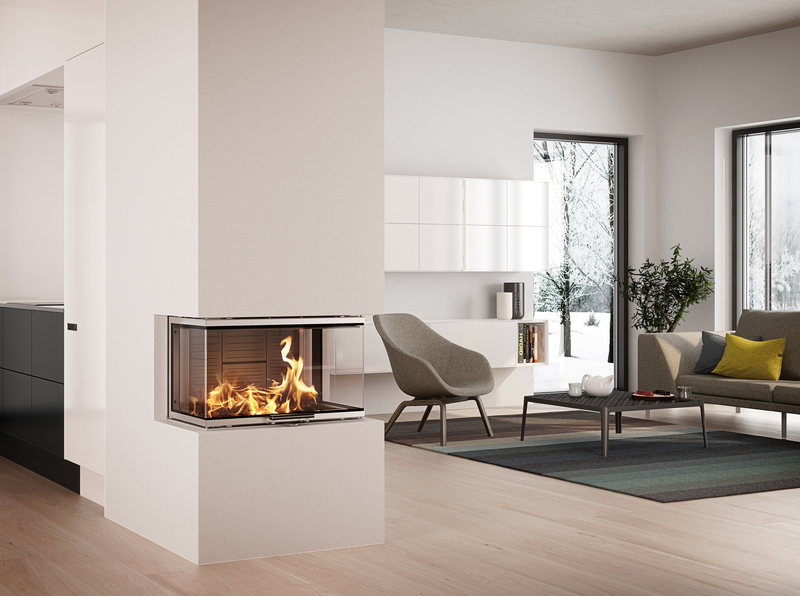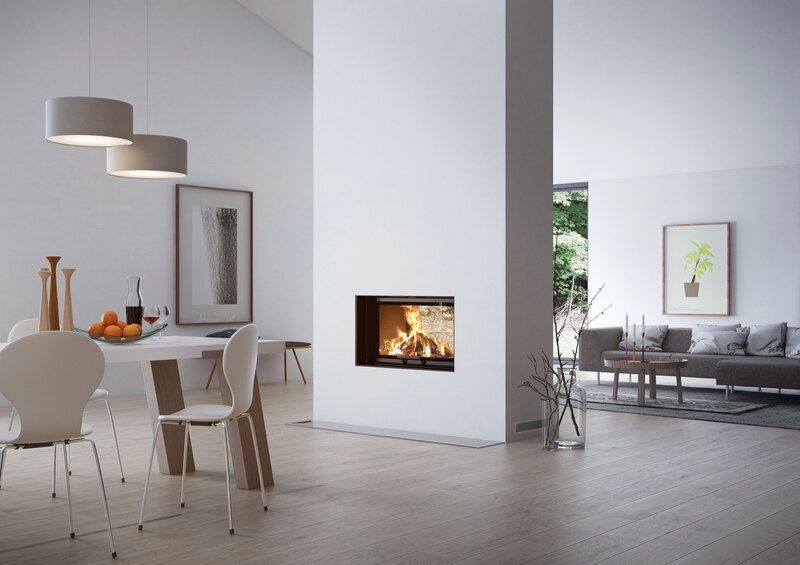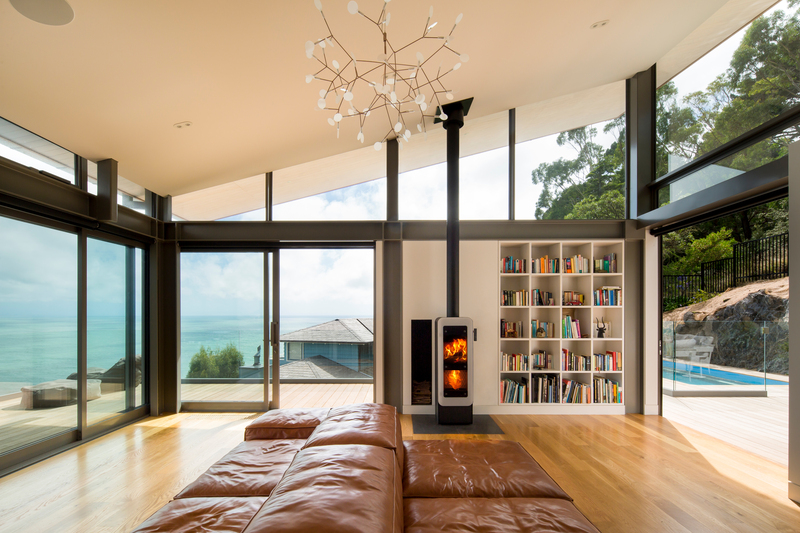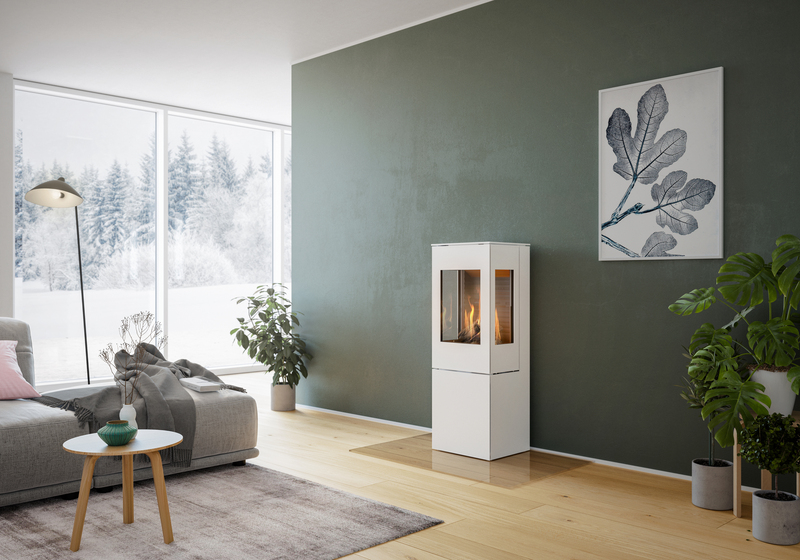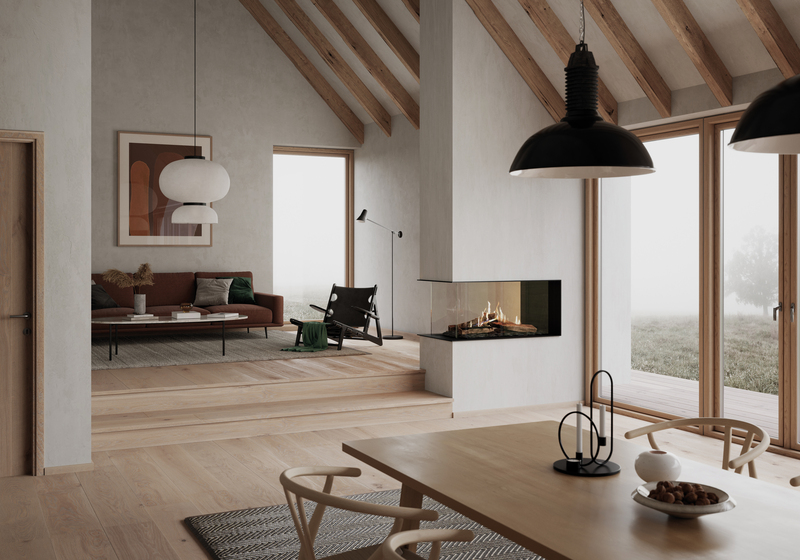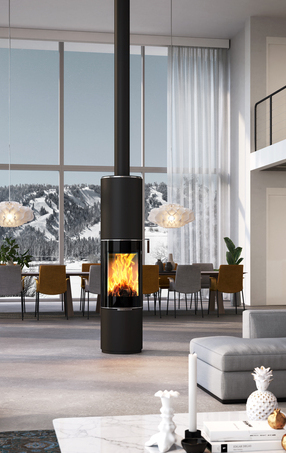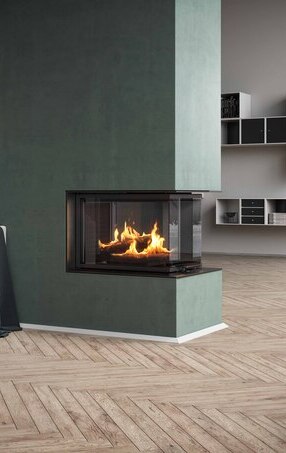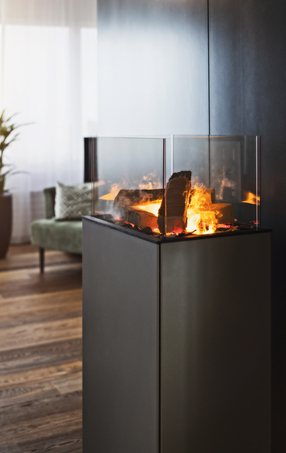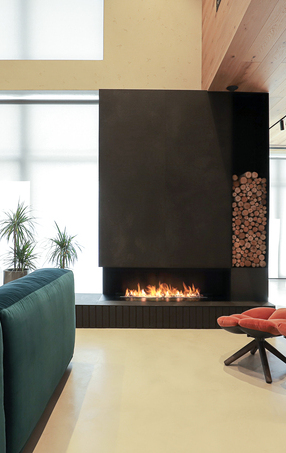You see the contents for the location:
Fire FAQ - for cosy hours by the fire.
Experience cosiness and functionality in perfect harmony with our stoves and fireplaces. In our FAQ section, we have compiled answers to the most frequently asked questions about these special heat sources for your home.
Before buying the wood fireplace
There are a few factors to consider when choosing a stove. Deciding on the shape, size and materials of the stove is a question of taste, heating requirements and in which rooms the stove will be installed. Arrange a non-binding appointment with a dealer who can show you the right options for your home. You can find your nearest dealer here.
As the stove is not just a source of heat, but also a piece of furniture that must match your interior and personal style, this question is central. Of course, the basic question of fuel should be asked first. Once this has been clarified, Attika offers you a wide range of stoves and fireplace inserts. Our fireplaces are known for their perfect finish and long service life. To guarantee this, we only use selected, high-quality materials and raw materials. All Attika fireplaces currently on sale fulfil the strictest environmental and quality requirements.
Be inspired by our products on the website and make an appointment with your local dealer.
The price of an Attika stove or fireplace varies depending on the model and the options selected (CleverAIR™, heat-storage module©, etc.). Ask your local dealer for the price of your chosen stove.
The kW rating indicates the output of a system and how much radiant heat the appliance emits. However, the actual heat output depends on the amount of wood selected by the user. The size of the room is crucial for a pleasant room climate. Each kW of heat output can heat an area of 10 m2 (approx. 25 m3 room) (in newer buildings with good insulation). Your specialist dealer can advise you individually on this issue.
A stove is a free-standing stove (see figure 1). A fireplace insert can be installed individually (see figure 2).
Every chimney is different and depends on the location. The legal guidelines also vary depending on the country and federal state. It is best to contact your local dealer or chimney sweep.
The CleverAIR™ and ElectronicAIR™ automatic air control systems from Attika regulate the air supply to your stove. The right amount of air is supplied to the inside of the stove when the firebox heats up - either mechanically or electronically. Automatic burn-off control therefore has significant ecological advantages because it completely eliminates operating errors that can occur when manually adjusting the fresh air supply.
Remember that the chimney is decisive and therefore responsible for the draught behaviour of the stove. If the stove is connected to a flue pipe that is too large, the manual air control has the advantage that it can remain fully open for longer periods of time. This is important because warm air is known to rise.
If this air (smoke) enters a larger volume, it cools down more quickly, which slows down the flow rate. As a result, the air does not escape and flows back into the room. When choosing the right air control, it is best to contact your local specialist partner. They will be able to advise you on your personal requirements and the exhaust system already installed.
Of course. Many of our fireplace inserts fulfil the function of a partition wall and can be used as an eye-catcher in the living room. Such as the VISIO 3:1, VISIO tunnel or VISIO 3:1 ST fireplace insert.
Yes, of course. We recommend that you look for a small firebox when choosing a stove. For example, the small, compact Q-TEE 2 from Attika. A stove made of soapstone or with a heat-storage module is also recommended for smaller rooms.
When buying a stove, it is worth taking a close look at the firebox door. Our tip: Open and close the firebox door several times at the point of sale:
- Does it open easily and close again completely? Does it even lock automatically?
- Does the hinge run smoothly?
- Listen for a pleasant closing noise. You will hear it many times at home.
- How does the handle feel in your hand?
- Does the door feel solid, compact, tight and heavy? Or is it made of thin steel plates?
- Are all the seals on the inside of the door cleanly finished?
The Self-Locking-System© (SLS©) developed by the Attika designers in Switzerland is a special convenience. It allows the firebox door to be opened very easily in an ergonomic movement with a gentle pull. It is best to ask your local Attika dealer to demonstrate the Self-Locking-System© to you.
Yes, of course. To do this, the stove must be installed room air independent. This means that the fresh air required for combustion is not taken from the room where the stove is located, but is supplied to the stove in a controlled manner from outside via a pipe/duct connection.
In almost all parapet stoves and fireplace inserts, this connection can be fed either through the floor or through the rear wall using the so-called AIR system. Thanks to the AIR system, you can easily install your stove in a low-energy or Minergie house. Please be sure to observe the country-specific requirements.
The bionic fire™ EVO and bionic fire™ STUDIO stoves are the cleanest stoves in the world.
Thanks to innovative technology, bionic fire™ burns with two fires - upwards and downwards. This afterburning makes the stove, which was created in cooperation with the German innovation consultants from Global Mind Network, one of the cleanest stoves in the world: 86% energy efficiency, 4 mg particulate matter, 302 mg CO - these are the best values ever measured at the accredited test centre of the Danish Technological Institute in Aarhus.
Simple operation
Firing with bionic fire™ is convenient and simple: place the wood on the fire, light it, close the firebox door. The technology takes care of the rest. The automatic switchover activates the afterburning with the bionic flames in the lower firebox when there are sufficient embers to clean the flue gases. A sophisticated automatic system controls the air supply reliably from A to Z. It utilises the natural physical properties of thermobimetals that have been tried and tested millions of times and ensures that bionic fire™ burns cleanly and efficiently at all times.
Installing the wood fireplace
We recommend that you have the installation of your stove carried out by a stove fitter/Hafner. This ensures professional installation and correct connection to the flue gas system. Find your local Attika specialist partner.
Contact a stove builder in your area. Based on your living situation and heating requirements, he can show you the best possible stove solution.
The distances to combustible materials vary depending on the stove version and the placement of the stove in the room. You will find the manufacturer's minimum distances in the installation manual for your stove. A base plate is often used to protect the floor. Please note that local and building regulations and fire regulations must be observed. Check with the local fire inspector / chimney sweep / chimney sweep.
No, this is not possible for legal reasons. You always need a functioning chimney to install a stove or fireplace insert. Nevertheless, you don't have to do without fire: The electric fire offers you the perfect alternative.
If the dimensions of the stove and flue gas system match, yes.
The fireplace is the engine of the stove, which means that the stove and the flue gas system must form a single unit. This means that the flue gas system should ideally have the same diameter as the stove's flue outlet. Most Attika stoves have a flue outlet (spigot) with a diameter of 150 mm.
In addition, the flue gas system should ideally have a length of at least 4 metres, not have too many changes of direction and horizontal guides should be kept as short as possible.
Some newer houses are so well insulated that there is not enough oxygen for clean combustion. In this case, you can supply fresh air to the stove from outside instead of taking it from the room. We call this system the AIR system and it can be connected to almost all attika stoves. Please be sure to observe the country-specific regulations.
Yes, if your stove ideally also has a diameter of 200 mm at the flue outlet. The dimensions of the stove and flue gas system should not differ too much.
Wood fireplace in operation
You can use almost any type of natural wood as firewood. The quality of the firewood contributes a lot to a beautiful fire. We recommend well-stored hardwoods such as beech, birch or oak, as these give plenty of embers and a quiet fire. Use well and long-dried logs.
The wood should be stored in a weatherproof place and protected from ground moisture. The logs should be stored face outwards with sufficient space between the floor and the logs. This allows the air to circulate optimally. Closed rooms such as garages or cellars are not suitable for storing firewood. Before you burn the logs, take them inside into the warmth a few days before use. This allows it to dry out again. Wood storage units in various designs are ideal for this purpose.
The drier the wood, the higher the usable energy consumption. The wood should have a moisture content of 17 - 20 %. The moisture content can be determined using a wood moisture meter.
The amount of firewood (preferably natural beech, birch or oak) varies depending on the stove model, the size of the firebox and the desired calorific value. Please read the stove manufacturer's user manual. In general, the weight of a piece of wood for a stove should be less than 1 kg. Also use kindling wood made of softwood such as fir wood and a firelighter to light the fire.
Read our useful tip here or watch our firing video.
Wood briquettes are mechanically compressed wood waste such as sawdust and sawdust. As a result, they contain less moisture and a higher density than classic firewood. As a result, briquettes and classic wood logs differ in the amount of energy contained in a single piece.
Specifically, briquettes achieve a calorific value of approx. 5 kW/kg. In comparison, the best normal heating wood has a calorific value of around 4.4 kW/kg. In order not to exceed the maximum fuel load of the wood-burning stove, these pressed pieces of wood should be broken up. (Experience shows that most users do not do this as it causes a lot of dirt). In principle, wood briquettes can be used for firing, but the quantity should be adjusted accordingly (guide value 1 kg per hour).
You should never burn painted, laminated, impregnated or plastic-coated wood, painted waste wood, chipboard, plywood, nutshells, pine cones, newspaper, coal or household waste in your stove. The substances produced during combustion are harmful and polluting exhaust gases that damage the surroundings and the stove.
Various factors influence the wood consumption of a stove or fireplace insert. Read our blog post on this.
You can place a safety gate in front of the stove to prevent children from getting too close to the hot stove. Never leave small children unattended near the stove.
If the stove no longer responds to the air control, in most cases this means that the door is not closed properly. This means that the air supply cannot be reduced because air can enter the firebox in an uncontrolled manner. You can read how to check whether the door is closed properly in the next question: "The stove door won't close. What can I do?"
To find out whether the door closes properly, use the paper test: Clamp a sheet of paper in the door and close the firebox door. If the sheet of paper can be moved, the door is not closed properly. Check whether something is jammed in the ash drawer or whether it has not been inserted correctly.
You can also take a close look at the catch on the door closing system (SLS). If it is folded in and the spring is not tensioned, the door will no longer close. With light pressure, the catch can be carefully (sharply) pushed back into place. If none of these cases apply and the door still does not close, please call your dealer.
You can place a piece of blotting paper/floss paper on the areas with candle wax and then run a hot iron over them. The stove must be cold. You can also gently sand over the areas with fine-grained sandpaper. The soapstone is a soft stone and therefore the candle wax can penetrate deep into the stone. The more you fire the stove, the faster the wax will come off.
Not too big. The wood logs should weigh a maximum of 700-800 grams. Depending on the stove, 2-3 logs. Several logs burn better and cleaner than just 1 large piece. Please also refer to the user manual for your stove.
If the VIVA L oven is fired correctly, you will reach a baking chamber temperature of 160 - 180 °C and a base plate temperature of 260 - 300 °C after about one hour. To achieve this, you should not use more than 2 kilograms of wood for firing. You should not add more than 1.4 kilograms of wood. You can find more tips on operating the VIVA L oven in the user manual.
Maintenance of the wood fireplace
Only clean the wood-burning stove when it is cold. With a steel stove, you can clean the outside with a clean, dry cloth. Make sure that there are no scratch marks. If the outside of the stove is made of soapstone or ceramic, it can be cleaned with mild soapy water or with Attika's dry and damp cleaning agent. You can clean the glass ceramic panes with a glass ceramic cleaner. Do not spray the cleaning agent directly onto the glass, but onto a cloth, as otherwise the door seals may be damaged.
Regularly cleaning the glass pane of your stove or fireplace ensures a clear view of the fire.
During the combustion process, various particles form and stick to the glass. If the deposits on the pane are not cleaned regularly, components of the deposits can react with the glass ceramic material. Unsuitable cleaning agents can also damage the disc surface, especially if residues remain on the disc and are exposed to high temperatures. To avoid cloudy surfaces (white film), the combustion chamber should therefore not be overheated and the glass should be cleaned regularly.
Regular lubrication of all moving parts on the stove is essential for the stove to work properly. We recommend the use of Neoval or WD-40 sprays, as the use of other products can lead to the formation of odours or residues. Door latches, hinges and movable handles should be lubricated with a small spray.
When spraying, cover the coating with some household paper to avoid stains. Move the door back and forth slightly after lubricating. It is best not to use too much spray at once - instead, repeat the process regularly.
You can get the right lubricant from your local dealer and can count on their help if you have any questions.
es, we recommend regular maintenance so that you can enjoy your fireplaces for years to come. The fireplaces and flue pipe should be checked and cleaned annually by a district chimney sweep. Ask your local dealer for more information.
Maintenance of the stove is most suitable before the start of the heating season. You can carry out the maintenance yourself or have it done by a specialist. We recommend having a chimney sweep carry out the annual inspection and cleaning of the flue pipe. Remove ash residues from the firebox, vibrating grate and ash drawer of the wood-burning stove. Check the seals and replace damaged seals.
Lubricate all moving parts such as door hinges, door lock and door slide rails with a lubricating spray. The spray should not leave any deposits. Check the firebox lining (fireclay / Skamol). The strong temperature fluctuations can cause cracks, but these have no influence on the stove's functionality. The firebox lining only needs to be replaced if it crumbles out after years. Have a new firebox lining installed by a local fireplace fitter.
There can be several reasons for odours from your stove. If the stove has not been used for a long time, dust and dirt can accumulate, which can cause odours due to heat.
The ash must be completely cooled down before it is disposed of. It is best to wait 24 hours before removing the ash from the firebox of the fireplace. A shaking grate and an ash drawer make it easier to remove the ash from the stove. Almost all Attika stoves and fireplace inserts have a riddling grate and an ash drawer. The remaining ash residue in the firebox can be scooped out with a fireplace tool or conveniently vacuumed out with an ash vacuum cleaner.
Place the ash in a fireproof metal bucket and leave it there for at least 2 days. In most cases, the ash can be disposed of with the regular rubbish.
No, on the contrary. Cold ash in the firebox makes it easier to light the stove again.
Smoke in the stove can be caused by insufficient draught in the chimney, wet wood or wood that is too large. Soot on the outside of the wood stove is usually caused when the door is opened while the flames in the stove are still high. Wait until the fire has gone out before opening the door. It may also be because the door was opened too quickly. Always open the door slowly and carefully.
If the door is left open for too long or too much smoke is produced when firing up, soot marks can appear above the firebox door on light-coloured stoves. The cleaning agent for light-coloured steel stove surfaces helps to remove these traces from parapet stoves with light-coloured paintwork such as white, nickel or silver. It also reliably removes grease stains, oil stains and dirt and is specially designed for cleaning the outside of painted surfaces. The stove can be gently cleaned with a microfibre cloth or a Jemako cloth (Attika recommendation). The cleaning agent should not be used on dark surfaces (Attika lacquer colours black, mocha), as differences in shade may occur after use. Always follow the instructions in the product instructions for use.
Health and environment - Wood fireplace
If your stove is subject to BImschV1, this means that the stove may no longer be installed or relocated, but stoves that have already been installed may continue to be used. You can find out whether your Attika stove still fulfils the 1st BImSchV in Germany on the HKI Industrieverband Haus-, Heiz und Küchentechnik e.V. website. Go to the HKI website.
If your stove no longer fulfils the 1st BImSchV, please contact Attika's internal sales team. We will be happy to help you decide on a new stove and make you an interesting offer.
The Federal Emission Control Ordinance (BImSchV) in Germany sets out regulations for clean air that apply to all stoves and inserts. As the legal regulations have changed in recent years, models installed before 22 March 2010 will not be approved for further operation from 31 December 2024.
The aim is always to achieve the highest possible efficiency with the lowest possible emissions. To achieve this, stoves are extensively tested in lengthy processes. The resulting values are relevant when installing the stove and are checked by the chimney sweep. Attika stoves are characterised by their long service life and functionality and are a sign of Attika's quality promise. As some stoves were tested before the new regulations were introduced, they must be retrofitted or replaced to fulfil BImSchV 2. What does retrofitting mean? An active fine dust filter (particle separator) can be installed to achieve the specified limit values.
Check with your Attika dealer whether this costly option makes sense for your stove. If your Attika stove has been in operation for many years, it may be cheaper to replace it completely. Ask the Attika sales team for an interesting offer.
The aim of the Ecodesign Directive is to minimise the environmental impact of energy-related products, taking into account their entire life cycle. The EU regulations define the minimum requirements for solid fuel heating appliances that must be met in order for these appliances to be sold on the European market.
What does this mean for stoves or fireplaces that have already been delivered and installed?
The Ecodesign Directive came into force on 1 January 2022. This means that the directive has no impact on stoves or fireplaces with wood combustion that have already been installed (installed before 31 December 2021). However, older fireplaces that have already been installed must comply with the country-specific and regional regulations for the use of heating appliances.
Models that were delivered by the manufacturer to the dealer before 1 January 2022 and are available in showrooms and warehouses may be purchased from and installed by the dealer. This applies provided the fireplace fulfils the current country-specific requirements, such as BImSchV ll in Germany or LRV in Switzerland.
Fireplaces produced and ordered from 1 January 2022 comply with the Ecodesign Directive 2022.
The wood-burning stove sector is above all a world of compromises between aesthetics, comfort and technology. Thanks to the customized-concept, Attika stoves offer many aesthetic and technical possibilities. For example, we offer the VIVA L model with or without side windows. The stove is also available with manual or automatic CleverAIRTM air regulation.
These factors have a direct influence on the performance of the product. At Attika, the products are tested in the combination in which they are least efficient. In this case, the energy efficiency of the VIVA L model with side windows and manual air regulation is tested and specified in the laboratory. Although the model without side windows and with CleverAIRTM achieves the higher performance, the lower values are given for Attika. This makes them difficult to compare with competitor offers, as the models can be combined in a wide variety of ways.
Basically, the automatic air regulation system ElectronicAIRTM achieves the best energy efficiency and the mechanical air regulation system CleverAIRTM achieves better values than manual control.
Wood stoves and fireplaces are CO2-neutral, as the burnt wood emits the same amount of CO2 as would have been produced by natural decay.
When using your stove, you should always open the door slowly. In this way, you avoid the flue gases from the stove being blown into the room and affecting the indoor climate. With Attika's AIR system (external air supply), the stove burns room air independent and the room climate is not affected.
If you have any health issues, you should always consult your doctor.
There is no reason to avoid a stove fire during pregnancy. This used to be the only way to heat old houses. If you have any doubts, please consult your doctor.
Before buying the gas fireplace
Whether you have a gas fireplace insert installed or buy a freestanding gas stove depends on your needs and the premises in which the gas fireplace will be installed.
Various models, sizes, materials and additional options are available for gas fireplaces and gas stoves. For a suitable gas fire solution in your home, contact your nearest dealer or visit our showroom in Cham.
In addition to being a source of heat, a gas fireplace is also an architectural element that needs to match your personal style. Attika has a wide range of high-quality gas fireplaces and gas stoves that offer many options for customised gas fire solutions. Visit the showroom of your local specialist dealer and let them show you the gas fireplaces live.
The price of an Attika gas stove or gas fireplace insert varies depending on the model and options (side window, designframe, anti-reflective glass, etc.). Ask your local dealer for the price of your chosen gas fireplaces.
Gas fireplaces use a different system to conventional wood fireplaces - namely one with two ducts (las tubes) in one. One for the combustion air, which draws in air, and one for the hot exhaust air, which emits it. Contact a recognised dealer who can assess on site whether your current chimney is suitable or whether it needs to be renovated.
Yes, in some cases a gas fire can produce more heat than a conventional stove. In addition, it is quick and easy to adjust the heat using the remote control or an app.
Yes, of course. The VISIO Gas Roomdivider and VISIO Gas Tunnel gas fire inserts are particularly suitable for this. They are ideal for use as a partition wall and architectural element in the living room.
Example: For an 11 kW appliance, the gas consumption is as follows:
- Approx. 1.1 m3/h with natural gas
- Approx. 0.38 m3/h with propane (0.75 kg/h)
Installing the gas fireplace
The installation of your gas fireplace must be carried out by an authorised specialist. This ensures professional installation and gas connection to the flue gas system. Contact your nearest dealer.
No, the installation of the gas stove must be carried out by a specialist. Professional installation and proper connection to the flue gas system ensure a correctly functioning gas fireplaces and compliance with legal requirements. Ask your local chimney builder for advice.
Contact a local specialist. He will be able to show you the best possible solution based on your heating requirements and living situation.
No, this is not possible for legal reasons. You always need a functioning chimney to install a gas fireplaces or gas stoves. However, depending on the country, there is the option of an external wall connection if a connection on the roof is not possible. Please ask your local chimney sweep about this.
External gas must be supplied to operate the gas stove or gas fireplace. Either via a gas cylinder, which can be concealed, or via a permanently installed gas connection with natural gas or propane gas.
The distances to combustible materials vary depending on the version of the stove and the placement of the gas stove in the room. You will find the manufacturer's minimum distances in the installation manual for your stove. Please note that local and building regulations and fire regulations must be observed. Contact your local fire inspector/chimney sweep for more information.
No, the appliance receives the necessary fresh air supply from the pipe in the chimney. It does not need any additional fresh air inlets.
Gas fireplace in operation
Attika gas fireplaces can be operated with natural gas or liquid gas (propane gas). Depending on your needs and living situation, the gas fireplace can be operated with a gas cylinder or connected to a gas pipe.
It is difficult to make a general statement about gas consumption. Consumption depends on your heating behaviour and the heat output of your gas fireplaces or gas stoves. If the gas stove always burns at the highest level, it will burn more than if the heat output is set to the lowest level. The size of the room to be heated and the output of the gas fireplaces also play a role.
Yes, in some cases a gas fire can produce more heat than a conventional stove. In addition, it is quick and easy to adjust the heat using the remote control or an app.
This of course depends on the individual use of the appliance. To give you an idea: with an output of 10 kW, a 10.5 kg cylinder will last for approx. 13 hours.
The gas fireplace can be set quickly and easily using the remote control supplied. You can use it to switch the gas fireplace on and off, regulate the heat output, continuously adjust the flame height and switch on the LEDglow functions. The gas stove can also be controlled using an app.
Yes, you can. All you need to do is connect a WiFi module and a power supply unit. For safety reasons, the gas fireplaces can only be operated on the same network. The Attika app is called «attika Fire App» and is available for iOS and Android.
The gas appliance consists of a combustion chamber in which combustion takes place. This is equipped with safety valves. An electronic gas valve allows the desired amount of gas to pass through to a burner, where the air required for combustion is introduced. This produces the flame. Ignition takes place automatically via a spark system. Combustion is continuously monitored by a detection system, which switches off the gas if there is no flame.
None. As propane is heavier than air, there is a risk of gas accumulation in the event of a cylinder fault. Propane cylinders must be stored outdoors.
Yes, the flames of propane gas are slightly lower than those of natural gas. This is because propane gas is heavier than natural gas.
VISIO GAS fireplace inserts and all Attika gas stoves can be operated with biogas.
Attika gas fireplaces can be operated with both L gas and H gas. As H gas has a higher output, the outgoing output (heat output) will also increase. This is not a problem as the stove is designed for both types of gas.
Maintenance of the gas fireplace
Yes, a gas fireplace or gas stove requires annual maintenance. Even if the gas fireplace has not been used often. Maintenance should always be carried out by a specialist. Ask your local dealer who can carry out maintenance on your gas fireplace.
Gas fireplaces in Switzerland can also be serviced by our Service & Technical Team. Please fill in our maintenance form.
Even if it is not visible from the outside, the inside of the gas installation can be dirty. Dirt and dust can cause malfunctions. This is why regular maintenance is important to ensure the proper operation of your gas fireplace. In addition to cleaning, maintenance also involves checking the technical components and tightness. Contact your local specialist for more information.
You can clean the glass panes on the outside of the gas fireplaces yourself. We do not recommend cleaning the inside of the glass panes, as you would have to remove the panes. Before cleaning the outside of the glass ceramic panes, please check whether your gas fireplaces have an anti-reflective glass coating. If the wrong agent is used to clean an anti-reflective glass, the coating may be destroyed and the anti-reflective effect will no longer be present. For a glass ceramic pane without a special coating, use a glass ceramic cleaner. For panes with an anti-reflective coating, please use a special cleaner.
We recommend that you do not remove the glass pane yourself. The positioning of the various components in the interior of the gas fireplace such as ceramic logs, ceramic chips, filaments, etc. have an important function and should not be moved. If the glass ceramic pane is removed, the components can be displaced and the proper operation of the gas fireplace is no longer guaranteed.
No, we recommend that you have an LED light in your gas fireplaces or gas stoves replaced by a specialist. Please contact your local dealer.
In the event of commissioning, maintenance or an unexpected error message, the specialist must have direct access to the electrical components.
You do not need to do anything to the components in the service door yourself. Carefully remove accumulated dust with a hoover from time to time.
Yes, of course.
Health and environment - Gas fireplace
There is no connection between the inside of the combustion chamber of Attika gas stoves or gas fireplaces and the room. Therefore, the operation of a gas fireplaces has no effect on the indoor air quality.
If you have any health issues, you should always consult your doctor.
There is no particular reason to avoid gas fireplaces during pregnancy. If in doubt, please consult your doctor.
Our products
Be inspired by our diverse product world.
